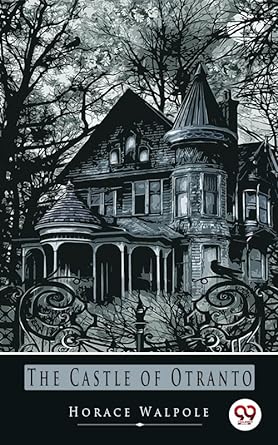
The Castle of Otranto
The Castle of Otranto by Horace Walpole is the original Gothic novel, the book that launched all the horror tropes we know and love from Dracula and Frankenstein. The book purports to be a manuscript from 9th–11th century Italy that was found and Walpole translated pseudonymously. It immediately became popular, gaining cachet with popular readers and critics alike. However, in the printing of the second edition, Walpole revealed that he had written it, inspired by a dream. Infuriated that they were tricked, critics dismissed it as fluffy romantic fiction and morally suspect. The ruse did, however, launch the trend of gothic literature as “found” literature.
The plot: Manfred of Otranto is an Italian lord. He has two children, Conrad and Matilda. On Conrad’s wedding day, Manfred discovers his son crushed by an enormous helm that inexplicably fell from the sky. The helmet resembles that of a statue of Alfonso the Good, the historical lord of Otranto. Manfred recalls a prophecy that Otranto ‘should pass from the present family, whenever the real owner should be grown too large to inhabit it’. Driven by fear that he will lose the castle, Manfred hatches a plan: divorce his wife (Hippolita) and marry Isabella, the late Conrad’s fiancé. Isabella has no desire to marry Manfred and flees for the church, setting off intrigues and supernatural horrors.
Walpole admires Shakespeare and states that his work is inspired by him. Like Shakespeare’s tragedies, it follows a five-act structure, with each chapter serving as an act. Like a play, dialogue dominates the novella. The servants act as comic relief; In one particularly amusing scene, Bianca, one of Manfred’s servants, relates an important supernatural event but takes so long to get to the point she only irritates Manfred. Hamlet is referenced—ghosts speak directly to the characters as speakers of truth. Miscommunications and incomplete information drive the plot. However, unlike Shakespeare, The Castle of Otranto is melodramatic; it relies on heightening the emotions of each scene, sometimes to absurdity.
Christianity features heavily in the novella: one of the central conflicts is the political power of man versus the power of God. The holy characters are politically powerless against Manfred but have the backing of God. God never makes a direct appearance but acts through the ghosts of saints and other supernatural events. The church represents a sanctuary from the world of man - Isabella flees to the church because she knows that even Manfred will not violate it, and many characters consider taking vows to escape Manfred. The book is open to the possibility of forgiveness; the holy characters continuously forgive Manfred for his crimes. In the end, Manfred is undone by his own evil machinations. However, he is given a chance at forgiveness and abdicates his lordship to become a monk.
The male characters mostly regard the female characters as bargaining chips for their own ends, whether sexual or political. Even the holy friar Jerome uses Isabella as a bargaining chip to save his son Theodore. The women mostly lack any agency, dominated by the men in their lives. Manfred readily abuses the women in his life, and they are forced to take it without any recourse. Part of the women’s holiness is that they submit to the men in their lives. Hippolita readily consents to a divorce, even though she does not want to, because Manfred desires it.
In the preface, Walpole discusses that the novella is trying to marry the supernatural of the medieval romance with the psychological realism of the modern novel, but I think he misses the mark on psychological realism. The characters are mostly one-dimensional; even Manfred, the most fleshed-out of the characters, has very little psychological detail. Walpole even lampshades this one-dimensionality. In one scene, a mysterious knight comes to Otranto, claiming he is the rightful lord of the castle. Manfred, eager to impress his guests with his hospitality, lays out a feast for them. The knight and his retainers come to the feast in full armor and only open their helms to eat. Manfred attempts to engage them in conversation, but they do not speak. Manfred complains about their lack of manners and single-minded interest in their claim to Otranto. One reason for the lack of psychological depth is that there are seven main characters in a 120-page novella. We don’t have much time to get acquainted with each one and their backstories before the next part of the plot is advanced.
Overall, while I enjoyed this book, I didn’t find it particularly deep.